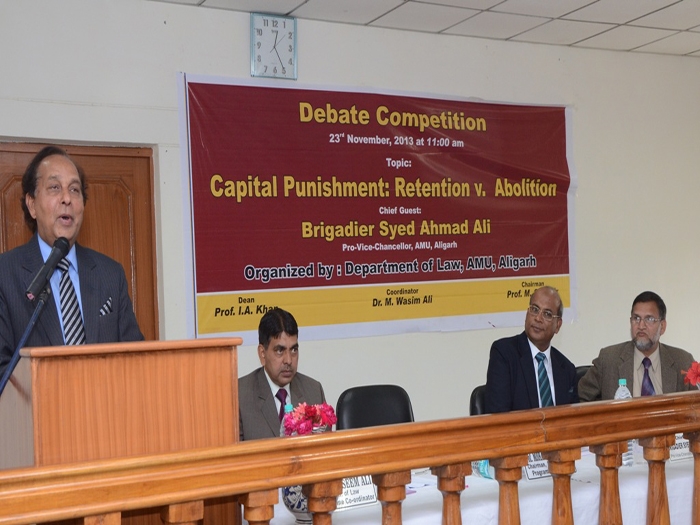| Source : Date : |

Aligarh, Dec 12: Former Dean of Law Department of Aligarh Muslim University (AMU) Prof Mohammad Shabbir revolted against the All India Muslim Personal Board on the issue of Triple Talaq.
Staying away from the Kolkata Meeting of the AIMPLB on this issue, he decided to severe his four-decade long association with the Board due to its adamant attitude on this sensitive issue.
Anguished over the stand adopted by the All India Muslim Personal Law Board (AIMPLB) on the issue of triple talaq, Prof Mohammad Shabbir, former dean, faculty of law, Aligarh Muslim University (AMU) and AIMPLB member of the since 1976, has revolted against the stand of the Board on ‘Triple Talaq’.
His resignation is seen as a great set-back to the AIMPLB, especially against the background of the Allahabad High Court’s last week decision on Triple Talaq issue and its observations on the AIMPLB.
The Allahabad High Court, it may be mentioned that has ruled that ‘Triple Talaq’ violated the constitutional rights of the Muslim women and, that the AIMPLB has no constitutional validity.
Prof Shabbir, who served as Vice-Chancellor (Acting), Chairman, Deptt of Law, Dr Ambedkar Chair Professor of Law, and Coordinator, PG Studies and Research, International Islamic University, Malaysia, was associated with the AIMPLB since 1976, four years after the Board was founded in 1972. Since then, he was very active member of the Board.
In a letter to Maulana Mohammad Rabe Hasani Nadwi, President of AIMPLB and Rector of Nadwatul Uloom, Lucknow, Prof Shabbir said that he felt ‘disgusted, offended and outraged’ by observing the functioning of the present AIMPLB that has ‘become the victim of practicing favouritism based on sectarian considerations’.
He said that the Board has failed to focus on evil practices within the framework of the Muslim Personal Laws from Sharia point of view and on the remedial measures it has ‘terribly failed’ to reform and remove these evil practices.
Pointing to the evil practice of ‘Triple Talaq’, Prof Shabbir said in his letter that this practice was creating ‘hardships to Muslim females as it is against the true practice of Shariah in letter and spirit’. He termed ‘polygamy’ prevalent amongst Muslim men, as a practice against the true spirit of Quranic dictates that underline the strict compliance of equality and equity amongst co-wives.
Prof Shabbir pointed that ‘gender justice’ is under grave attack by the present irresponsible practice of ‘triple divorce’ and ‘polygamy’ in India besides numerous other issues which are in practice amongst Indian Muslims which are in ‘flagrant violation of the true principles of Shariah’.
Instead of providing remedy to address these challenging issues, the Muslim Personal Law Board is creating ‘stumbling block by giving opportunity to others for criticizing Islamm Prof Shabbir alleged, and said that AIMPLB’s image is created as against true ‘gender justice’ and ‘human rights’ while the truth is otherwise as Islam stands for unprecedented and matchless support for these values.
The Islamic scholar stated that most Muslim countries like Algeria, Egypt, Iraq, Jordan, Kuwait, Lebanon, Libya, Morocco, Sudan, Tunisia, Yemen, Palestine, Afghanistan, Bangladesh, Indonesia, Iran, Malaysia, Pakistan, Somalia and Turkey have amended and reformed their personal laws. If these Muslim countries can amend their personal laws why can’t the Muslims in India do, he wanted to know. He said that these laws were reformed and amended to reorganise and to unify for systematization/codification of divergent legal principles remedying the emerging issues contemporarily.
Pointing to the stark reality of Muslim Personal Law being ‘misunderstood’ and ‘ill-practiced’ in India, Prof Shabbir said that the common Muslims in India naively practice and ghastly distorted ‘Sharaih Law’. Muslim women devoid of all civil and legal rights, remain interned in their homes and never come out except under thick black veils – this seems to be the image of Muslim Personal Law in the Indian mind. Muslims are visualised in this country as people still living in the medieval ages, practicing their horrible personal laws, he wrote saying that this disgraceful image of the Muslims and their personal laws is subscribed to by people in all walks of life including both the laymen and the law-men.
Appealing to all Muslim scholars of Deoband, Dar-ul-Uloom, the Nadwat-ul-Ulema of Lucknow and others, Prof Shabbir urged them to wake up from their slumber and realize how extensively the principles of Islamic law are being misunderstood, misconstrued, misapplied and misused in India. He underlined the need for AIMPLB to set its own house in order and devote their energies to reform them by removing the anomalies and defects in the personal law in conformity with Shariah law and serve the cause of gender justice, equality, fraternity, non-discriminatory approach establishing its relevance in contemporary India.
Prof Shabbir said that it was high time for the AIMPLB to establish its credential, relevance and utility for the protection and promotion of Muslim personal law in conformity with the letter and spirit of the Islamic jurisprudence. But he lamented the indifferent attitude of the AIMPLB towards this serious issue that forced him to ‘offer my dissociation with it’.
Prof Shabbir has sent the copies of this letter to Maulana Syed Kalbe Sadiq, Maulana Syed shah Fakhruddin Ashraf, Maulana Sayeed Jalaluddin Umri, Maulana Mohd Salim Qasmi, Maulana M Wali Rahmani, Zafaryab Jilani, Maulana Khalid Saifullah Rahman, Prof Riaz Umar and Maulana Mohd Fazalul Rahman Mujaddidi, all office-bearers of the AIMPLB.